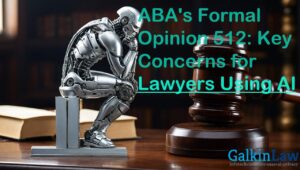
The American Bar Association’s (ABA) Formal Opinion 512 provides critical guidance for attorneys incorporating generative artificial intelligence (GAI) tools into their practice. The opinion highlights several ethical concerns and obligations that lawyers must consider to ensure compliance with the ABA Model Rules of Professional Conduct.
𝐂𝐨𝐦𝐩𝐞𝐭𝐞𝐧𝐜𝐞 𝐚𝐧𝐝 𝐓𝐞𝐜𝐡𝐧𝐨𝐥𝐨𝐠𝐢𝐜𝐚𝐥 𝐔𝐧𝐝𝐞𝐫𝐬𝐭𝐚𝐧𝐝𝐢𝐧𝐠
Lawyers are required to provide competent legal representation, which includes understanding the benefits and risks associated with the technologies they use, including GAI tools. While attorneys don’t need to become experts in AI, they must have a reasonable understanding of the capabilities and limitations of the GAI tools they employ, and this understanding should be continuously updated as technology evolves.
Use Cases Discussed in the Opinion:
- Electronic Discovery
- Contract Analytics
- Predictive Analytics
- Legal Research
- Contract Review and Drafting
- Document Review
- Generating Legal Text
𝐂𝐨𝐧𝐟𝐢𝐝𝐞𝐧𝐭𝐢𝐚𝐥𝐢𝐭𝐲 𝐂𝐨𝐧𝐜𝐞𝐫𝐧𝐬
One of the most significant concerns raised by the ABA is the protection of client confidentiality. Model Rule 1.6 obligates lawyers to keep all information related to the representation of a client confidential unless the client gives informed consent. The use of GAI tools can jeopardize this confidentiality, especially when using “self-learning” AI systems. These systems might retain and utilize client information in ways that could inadvertently disclose it to unauthorized parties or other clients. Therefore, lawyers must thoroughly understand the terms of any GAI tool, particularly how it handles data, before using it. Informed consent from clients is mandatory when inputting any client-related information into such tools.
𝐂𝐨𝐦𝐦𝐮𝐧𝐢𝐜𝐚𝐭𝐢𝐨𝐧 𝐚𝐧𝐝 𝐂𝐥𝐢𝐞𝐧𝐭 𝐂𝐨𝐧𝐬𝐞𝐧𝐭
Model Rule 1.4 requires lawyers to communicate with their clients about the means used to achieve their objectives, which includes the use of GAI tools. If the use of such tools affects the representation significantly, or if the client specifically requests, the lawyer must disclose their use and obtain informed consent. This communication ensures that clients are fully aware of how their data might be used and the potential risks involved.
𝐑𝐞𝐬𝐩𝐨𝐧𝐬𝐢𝐛𝐢𝐥𝐢𝐭𝐢𝐞𝐬 𝐭𝐨𝐰𝐚𝐫𝐝 𝐒𝐮𝐩𝐞𝐫𝐯𝐢𝐬𝐢𝐨𝐧
Lawyers with managerial or supervisory roles have additional responsibilities under Model Rules 5.1 and 5.3. These rules require lawyers to ensure that their firm’s use of GAI tools complies with ethical standards. This includes implementing clear policies and ensuring that all lawyers and non-lawyers in the firm are trained in the proper use of GAI tools, including understanding the risks and maintaining confidentiality.
I am available for consultation to help lawyers evaluate AI platforms, understand their terms, and assess the risks to ensure compliance with ABA Formal Opinion 512.
#LegalEthics #AIinLaw #Confidentiality #InformedConsent #LegalTech
